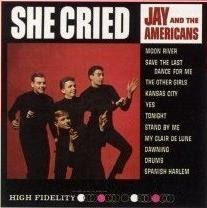So with that in mind, here are some songs from 1962 that I like.

Jay & the Americans - "She Cried"
An honest and tough breakup song. "And when I told her I didn't love her anymore, she cried."
Sha-la-la.
Gene Pitney - "The Man Who Shot Liberty Valance"
From what I gather, Burt Bacharach and Hal David originally wrote this song for the movie of the same name, but for whatever reason it wasn't used. Regardless, this song unfolds like a classic western film. There's a hero, a villain, a showdown, fair maidens, etc.
The Crystals - "He's a Rebel"
Early sixties girl groups are a guilty pleasure of mine. I really can't explain why I like the post-doo-wop pixie-like R&B stylings from groups like The Shangri-Las and The Dixie Cups and The Chiffons and whoever else. But I do, and that's that.
What's really interesting about this song is that this isn't really The Crystals. Producer Phil Spector wanted to record this song (penned by Gene Pitney, as a matter o' fact) as soon as he could, but his Crystals were on the other side of the country. So for a nominal fee he had a local group named The Blossoms record it. The song became a #1 hit and The Crystals became famous. The Blossoms did not.
The Tornados - "Telstar"
I mentioned producer Joe Meek in a previous post. With his outerspace fixation and his knack for electronics he helped craft this catchy little novelty instrumental that quickly became a #1 hit in the United States (The Tornados became the first British band to have a chart-topping song in the States, predating the British Invasion by two years).
Tommy Roe - "Sheila"
Buddy Holly had been such a prolific song-writer that record labels were able to release "new" Buddy Holly albums for years following his 1959 death. Something as trivial as dying couldn't ebb Holly's popularity, and subsequently (at least until the Beatles came along) there were many imitators. Tommy Roe would develop his own style in later years, but his first big hit was obviously influenced by Buddy.

